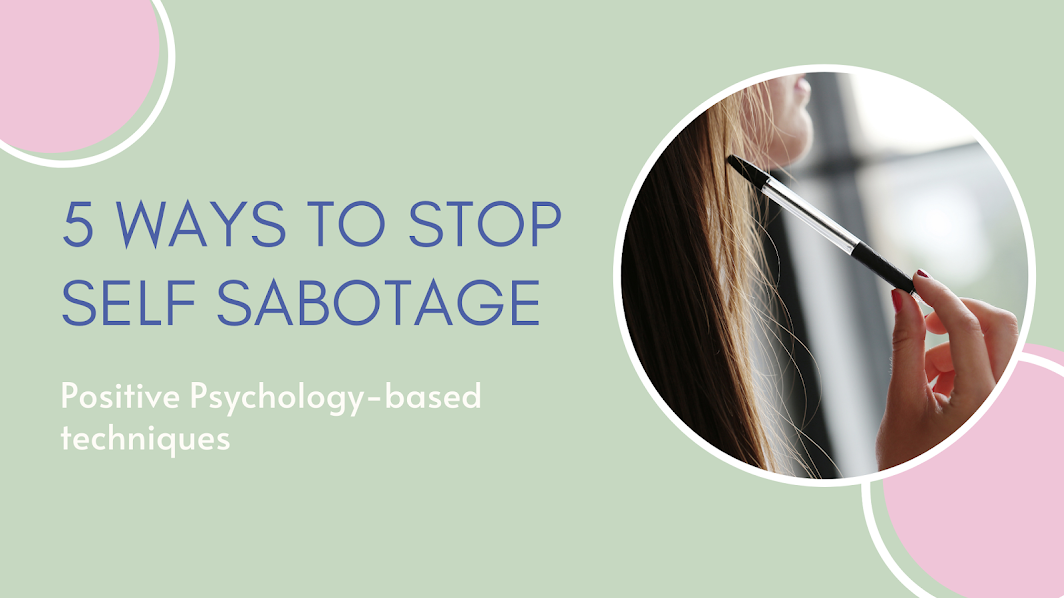How many times have you got in your own way? Is self sabotage a recurring problem for you?
If you are often the person standing in your way, then you’re not the only one! Self sabotage is real… particularly amongst women solopreneurs and small business owners. It’s also often the biggest thing that stops us from taking steps forward and truly growing and flourishing in the way we deserve.
What is self sabotage and when is it a problem?
Self sabotage can hinder our progress or success in many ways, it is “insidious, profound, and universal” and emanates from negative mindsets (Berg, 2015) and can be conscious or unconscious (depending on your level of self-awareness).
In terms of business and entrepreneurialism, self sabotage often manifests itself within procrastination, perfectionism, avoidance and negative thought processes. Indecisiveness and imposter syndrome are also types of self sabotage.
Procrastination from doing things that’ll move you forward, perfectionism that stops you from putting things out there and avoidance from pushing yourself out of your comfort zone, in a positive way. And then don’t get me started on the negative thoughts…
“I’m not good enough to do that”
“They’ve paid me to do xyz and I’m going to fail and let them down”
“People will think [insert non-sensical worry here] of me if I do that” etc. etc.
Self sabotage becomes a problem when it’s interfering in your daily life and your decisions and when a failure to address or recognise the behaviours, leaves you stuck in a self-destructive cycle – and I see many amazing women being held back by it every day. But not every act of self sabotage is easily identified – it can be a series of small decisions or thoughts that collectively, have a negative impact on your mood, thoughts or progression towards your goals.
Why do we self sabotage?
There’s no easy answer to this and no-one self sabotages on purpose! It could be to avoid conflict, or because the behaviours have been picked-up on in childhood or previous experiences, low self-esteem or trauma.
For example, I have worked with a lot of women who have left the 9 to 5 due to bad experiences with bosses or colleagues, who have had their confidence knocked and therefore are suffering with self sabotage and unable to move forward, as this was the behaviour they had become used to. It takes time and effort to reframe!
“Insecurity originates from the inner critic that tells us we can’t accomplish a certain task or aren’t good enough (Jacobsen, 2016).”
As solopreneurs, self sabotage is often linked to fear of failure and we can often “protect” ourselves from that potential failure by introducing dysfunctional habits or thinking patterns (aka self sabotaging).
Not sure if you’re sabotaging? Take this little quiz to find out.
Want to stop self sabotaging?
Here 5 ways, based in Psychology, to stop self sabotage:
1 – Consciously acknowledge thoughts
As with most things mindset related, the first (and often biggest step) is to recognise the thoughts or actions and take some time to acknowledge them.
A great way of acknowledging them is to write them down – whether that’s in a journal or just scribbled on a scrap piece of paper – write them down and read them (aloud if possible). Once you begin to do this regularly, you may be able to identify patterns in the self sabotaging behaviour… when does it happen, what triggers it? etc.
Journaling is something I advocate within my flourish membership & is a really useful, easy and free tool!
2 – Communicate those triggers
3 – Add in a positive
So it could be something like “When I get a new client and worry I’m going to fail then, I’ll write down all the things I’m good at”.
Positive self-talk is a great tool to use – engage in a conversation with yourself (yes, literally) and build a case for and against, addressing the sabotaging behaviour or thought. How legitimate is the worry? What evidence do you have to back that thought up? What evidence tells you otherwise? etc etc.
4 – Give yourself time
And if you don’t think you can do it alone…
5 – Seek professional help
Don’t suffer in silence or do it alone – everyone deserves to flourish and everyone is entitled to help.
